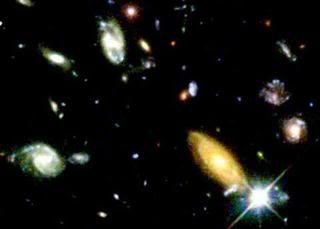Perhaps the simplest solution to the problem of why we seem to be alone is to suggest that this is because we are, in fact, alone. This hypothesis proposes that life (or, at least, intelligent, communicative life) is extremely rare and that the density of intelligence in the universe is so low that we should never expect to find anyone else out there. One pertinent argument against this hypothesis is the observation that life got an extremely early start on Earth. Practically as early as life could have started, it did. This would suggest that life needs minimally favorable conditions in order to start and to thrive. The upshot of this argument is that we should expect life and, hence, intelligence to be very common and not the product of a Great Accident.
One pertinent argument against this hypothesis is the observation that life got an extremely early start on Earth. Practically as early as life could have started, it did. This would suggest that life needs minimally favorable conditions in order to start and to thrive. The upshot of this argument is that we should expect life and, hence, intelligence to be very common and not the product of a Great Accident.
However, proponents of the CIH note that, although life on Earth got a very early start, it took four and a half billion years to produce sapience. Furthermore, if it weren't for a number of bona fide accidents (including the extinction of the dinosaurs) the Earth would probably still be barren of intelligence. This would suggest that intelligence is something that natural selection doesn't produce easily and that it may, in fact, constitute such a rare accident as to drive down the density of intelligent life to the point where the Fermi Paradox would be satisfied.
It should be noted that "low density" is a relative term. If the density of intelligent life is so low that there is only an average of one intelligence in ten galaxies, there are good reasons to believe that we would always be out of the communication range of fellow intelligences even though the observable universe would contain approximately one hundred million sapient species in it.
Thursday, September 13, 2007
The Fermi Paradox: The Cosmic Isolation Hypothesis
Labels: fermi paradox
Subscribe to:
Post Comments (Atom)

No comments:
Post a Comment